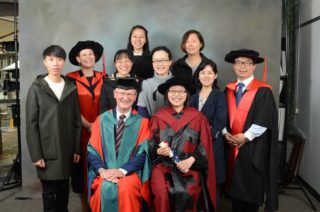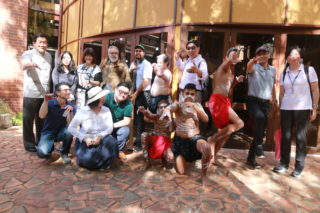2019

Graduation – Dr He Zhang
2019
Congratulations to CCAT’s latest PhD graduate Dr He Zhang (Jan Zhang)! Dr Zhang’s PhD dissertation topic was: Self-representation of Chinese Migrants Using Digital Storytelling for Social inclusion. To celebrate the conferral of her Doctoral degree we asked Dr Zhang a few questions:
1. Why did you decide to do a PhD?
I developed the interest in research during my postgraduate study. However, I was not sure about doing a PhD until I worked as a news editor in Shanghai for a year. At that time, I found the area that I was keen to doing research in – digital culture. The Chinese society was and still is going through a series of transformations due to people’s take-up of digital technology in many aspects of everyday life. The speed of technology upgrade and people’s adoption is unbelievable. As time went, the picture of doing a PhD in this area became clearer and clearer in my mind. So, when the opportunity eventually appeared, I didn’t hesitate to accept it.
2. What did you find most challenging about the PhD process?
I think the most challenging part is to make the materials I collected ‘speak’ to me. As a researcher, my assumptions are always challenged by the collected materials. That is when I need to be focused, patient, open-minded and honest in order to quiet down the assumptions and discover through data.
It was also challenging to figure out what we want to do in a PhD. Although we need advice from supervisors, it is important we figure this out on our own first. Otherwise the communication with supervisors can be ineffective, even confusing sometimes.
3. What did you enjoy the most?
The numerous moments of thinking through a point after discussing with supervisors, attending a seminar or walking on the campus. Sometimes they led to completion of a paragraph or a chapter, but most times they did not. In spite of this, this enjoyment of thinking and ‘tinkering’ makes me believe I have chosen the right path.
But they cannot compete with thesis submission, of course.
4. What advice would you give to students beginning their PhD journey?
My advice: do not hasten to make conclusions about what you may find through a PhD topic. It is natural that your understanding changes along the journey. The change is also a good sign – you have kept yourself well-informed about what you are researching.
Candidacy presentation by Qing Wang
2019
Women starting-up in the digital creative industries in China
Abstract
Throughout history technology is associated with pioneers, and most of these pioneers have been male. It’s not well known, however, that Ada Lovelace (1815 – 1852), the daughter of the English poet Lord Byron was a pioneer of computing technology. The interesting connection to note here is her relationship with culture, namely, the refined world of the arts. In this project I look at the relationship between culture and technology (or, culture + technology) as it applies to female practitioners in China.
The creative industries are used to be considered as ‘lying at the crossroads between the arts, business and technology’[1]; and as technological elements have increasingly come to the fore we have seen a shift to focus on so-called ‘digital creative industries’. This merging of culture and technology levels the playing field between genders and different income groups. We now see many people, especially younger generations, embracing creativity, digitalization, and entrepreneurism. Research on working patterns in creative sectors also has identified a close relationship between creative industries and entrepreneurship (see also: Baines & Robson, 2001; Higgs & Cunningham, 2008). Entrepreneurs are the key agents in the creative industries, and the quality of entrepreneurship affects the dynamics of this sector(Hartley et al., 2013, pp. 92-93).
This study chooses China as the research site. As a sector characterized by artistic, creative, innovative, and cultural, creative industries in China have grown rapidly over the past few years. What’s more important is that China is experiencing a digital transformation, whose speed, scope, and scale of growth and development receive much attention from the world. In order to take advantage of the increasing grassroots innovation in the digital age, for instance the popular Maker Movement, the Chinese government is promoting ‘Mass entrepreneurship and innovation’, trying to develop an entrepreneurial ethos and attract broad participation to gain robust dynamics.
In this context, and in response to United Nation’s development goal to ‘achieve gender quality and empower all women and girls’, I look at the female participation in digital creative start-ups and the emergence of female entrepreneurs in creative sectors, to identify their practices. This thesis will thus make a contribution to the knowledge of the creative industries, and will advance our understanding of the dynamics and structures that allow gender diversity, an innovative culture and entrepreneurial skills to develop.

Being Digital
2019 U40 China-Australia Summer School and Symposium
This event did not proceed due to the pandemic
Themes:
• Digital Disadvantage (Ageing; Disability)
• Gaming and Young People
• Digital Design
• Smart Cities and Communities.
Dates: 20 – 22 February 2019
Venue: Curtin University, Perth, Western Australia
Organiser: Centre for Culture and Technology (CCAT), School of Media, Creative Arts and Social Inquiry, Curtin University
Co-sponsors: Tencent Research Centre, Confucius Institute (UWA), School of Design, Curtin University
Format: The 2019 China-Australia U40 Summer School and Conference will be held at Curtin University from February 20 – 22. The theme of this year’s event is Being Digital. Sub-themes include: Digital Disadvantage (Ageing; Disability), Gaming and Young People, Digital Design, and Smart Cities and Communities.
The 3-day program provides post-graduate students and emerging scholars from China and Australia with a valuable opportunity to share ideas with leading experts in the fields of digital culture, gaming and design. Opportunities to present research; and to participate in focussed workshops; as well as to be mentored by experts in specific fields form part of the program. Accommodation and lunch will be provided to our participants during the summer school.
Submissions from Masters and PhD students; and from Early Career Researchers, carrying out research related to one of the themes of the workshop are welcomed.
Applications should include:
• A CV
• A 300 to 500 words abstract relating to new and unpublished research
• All applications should be in English, and use the abstract template, which is available for download here: https://bit.ly/2zLLVOL
Note: Successful applicants will be required to submit a research plan (long abstract) within 1,000 words and report the research plan at the summer school.
Important Dates
Abstract due: 10 December 2018
Acceptance notification: 17 December 2018
Full paper/Short paper due: 30 January 2019
Abstract submission and summer school enquiries: Qing Wang, qing.wang8@postgrad.curtin.edu.au
Other enquiries: Dr Huan Wu, huan.wu@curtin.edu.au

Moving Pictures
Raising dementia awareness in Culturally and Linguistically Diverse (CALD) communities
2019
In Australia, limited awareness of dementia in people from culturally and linguistically diverse (CALD) backgrounds often results in delayed diagnosis, poorer prognosis, and a higher burden of care on families and health systems.
Moving Pictures, an innovative multi-media project, aims to change this through the production of 15 short films co-produced with people from Hindi-, Tamil-, Mandarin-, Cantonese and Arabic-speaking communities. For each language, there are three films: Detection and Diagnosis, Navigating Care, and the Carer Journey. These films are based on the stories and lived experiences of carers of people living with dementia, and the expert views of key service providers.
Researchers from the National Ageing Research Institute and Curtin University have collaborated closely to recruit and video interview 57 carers and 19 Key Service Providers across Australia, develop the films, a hard copy resource for each of the communities, and the Moving Pictures website (www.MovingPictures.org.au) which is mobile-optimised and will host the films, the hard copy resources and provide links to essential services and organizations for CALD families and carers. The final products of the project will be officially launched at an event to be held in March 2019.
For further information please email Lynda Durack at Curtin University L.durack@curtin.edu.au
